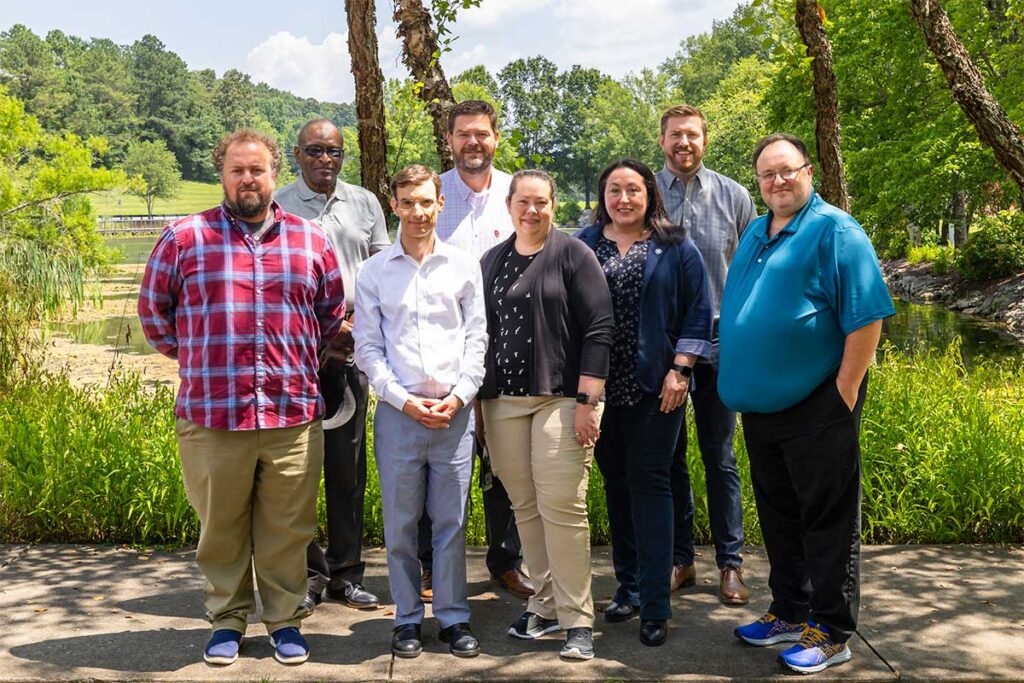UT’s Innovative Computing Laboratory to Coordinate Data Science for $26.4M Consortium
Radioactive materials constantly give off energetic particles in every direction. Nuclear forensic professionals can follow that distinctive signal like a trail of muddy footprints, tracking down the source of radiation to aid law enforcement efforts or ensure the security of a nuclear site.
Nuclear forensics requires cooperation between experts in nuclear science, nuclear security, law enforcement, and public policy—and, increasingly, computer science.
“High-performance computing (HPC) has enabled outstanding advances in computing capabilities, enabling faster problem solving in many scientific domains,” said Research Assistant Professor Deborah Penchoff. “It is becoming clear that HPC and artificial intelligence (AI) are critical to developing solutions for the betterment of society at local, national, and global levels.”
Penchoff, who holds a PhD in physical chemistry with a focus in computational sciences, worked at the UT Radiochemistry Center of Excellence and the UT Institute for Nuclear Security before stepping into her current role as the Associate Director of UT’s internationally recognized Innovative Computing Laboratory (ICL).
“Combined with my understanding of HPC, my experiences in nuclear security, radiochemistry, and public policy give me an ideal perspective to address needs in nuclear forensics,” she said.
Now, thanks to a new grant, Penchoff and the ICL will be able to support the disparate groups that contribute to nuclear forensics on an unprecedented scale.
The US Department of Energy’s National Nuclear Security Administration (NNSA) recently committed $25 million to create the Consortium for Nuclear Forensics (CNF), a five-year research partnership led by the University of Florida (UF) that spans seven national labs and 16 universities, including UT. The participating universities are contributing an additional $1.4M to the project’s funding.
The consortium is divided into five groups focused on goals like rapid turnaround forensics and advanced analytical methods. The teams will independently research and develop new technologies and methods in support of the NNSA’s nuclear security and nonproliferation missions.
Meanwhile, the ICL will boost the speed of their discoveries with HPC and AI—and make their data available to other NNSA researchers.
“We want others to be able to take advantage of our research efforts,” said UF Professor James Baciak, the director of the CNF. “That is a unique aspect of our consortium, and Dr. Penchoff brings a unique set of experiences and expertise that will help make it all come together.”
Under Penchoff’s leadership, George Bosilca (ICL), Stan Tomov (ICL), and Theresa Windus (Iowa State University) will coordinate computing efforts across the 23 member organizations of the Consortium, facilitating the flow of discoveries and new technology between the five teams.
“Developing solutions for these critical issues requires a diversity of perspectives,” Penchoff said. “This project is an excellent example of truly collaborative and interdisciplinary efforts, and I am excited to help everyone take full advantage of the latest HPC resources.”
Penchoff is particularly eager to bring the full potential of “exascale” computing to the consortium. Exascale computers can execute one quintillion operations per second, performing more than one billion times faster than a top-of-the-line consumer laptop. FRONTIER, the supercomputer at Oak Ridge National Laboratory, is currently the only true exascale computer in the world.
“As the project progresses, we will need to be highly adaptable,” said Penchoff. “We will have to consider how emerging HPC and data science tools can be applied to the consortium, even as the evolving needs of the consortium push us to develop new HPC tools.”
While the top priority of the consortium is to accelerate progress in nuclear forensics technology, it will also serve to educate the next generation of nuclear forensic specialists. Much of the research and development work will be supported by graduate and undergraduate students studying nuclear engineering, radiochemistry, computer science, materials science, and environmental science.
The HPC team will be no different, offering students opportunities as researchers, technical and operational staff, and intelligence analysts.
As part of her role in the consortium, Penchoff will also be developing data science workshops and other educational materials for students not directly involved in the consortium. These courses will emphasize the importance of flexibility and openness to new technologies as they become available.
“The skills gained during these kinds of opportunities are not only critical to advance mission-strategic efforts of national importance—they also provide training and career growth opportunities for members of the UT community and the state of Tennessee,” Penchoff said.
For example, the HPC team will be developing AI-based tools in a program that aligns with the new AI Tennessee Initiative, a UT-led program to increase the AI expertise of students in the many varied disciplines that are starting to intersect with AI.
“We are preparing the Tennessee student population for AI-enabled jobs in academia, industry, government laboratories, and community efforts throughout the state,” said Penchoff. “Students trained in the CNF will be able to directly contribute to nuclear-related needs in our state, in our national laboratory network, and across the nation.”
Contact
Izzie Gall (865-974-9387, egall4@utk.edu)
